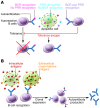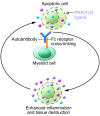Autoantibodies in systemic autoimmune diseases: specificity and pathogenicity
- PMID: 25938780
- PMCID: PMC4497746
- DOI: 10.1172/JCI78084
Autoantibodies in systemic autoimmune diseases: specificity and pathogenicity
Abstract
In this Review we focus on the initiation of autoantibody production and autoantibody pathogenicity, with a special emphasis on the targeted antigens. Release of intracellular antigens due to excessive cell death or to ineffective clearance of apoptotic debris, modification of self-antigens during inflammatory responses, and molecular mimicry contribute to the initiation of autoantibody production. We hypothesize that those autoreactive B cells that survive and produce pathogenic autoantibodies have specificity for self-antigens that are TLR ligands. Such B cells experience both B cell receptor (BCR) activation and TLR engagement, leading to an escape from tolerance. Moreover, the autoantibodies they produce form immune complexes that can activate myeloid cells and thereby establish the proinflammatory milieu that further negates tolerance mechanisms of both B and T cells.
Figures



References
Publication types
MeSH terms
Substances
Grants and funding
LinkOut - more resources
Full Text Sources
Other Literature Sources
Medical

